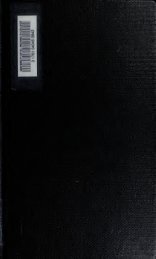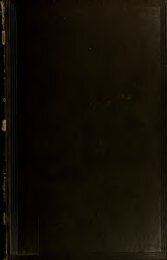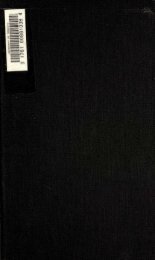Texts from the Buddhist canon : commonly known as Dhammapada
Texts from the Buddhist canon : commonly known as Dhammapada
Texts from the Buddhist canon : commonly known as Dhammapada
You also want an ePaper? Increase the reach of your titles
YUMPU automatically turns print PDFs into web optimized ePapers that Google loves.
40 DHAMMAPADA.<br />
possessed of right apprehension of Truth he in-<br />
cre<strong>as</strong>es in wisdom daily, he becomes a light in <strong>the</strong><br />
world ; however born/ his happiness is a thousand<br />
fold "greater, and in <strong>the</strong> end he shall escape every<br />
evil mode of existence."<br />
Hearing <strong>the</strong>se verses <strong>the</strong> mendicant arose and came<br />
before Buddha, and prostrated himself in his presence ; on<br />
which <strong>the</strong> World-honoured <strong>as</strong>ked him if he knew his former<br />
states of existence ; <strong>the</strong> mendicant confessed that owing to<br />
<strong>the</strong> indulgence of his carnal desires, he w<strong>as</strong> unable to<br />
penetrate such mysteries—on which <strong>the</strong> teacher explained<br />
how in <strong>the</strong> time of a former Buddha he had been a dis-<br />
ciple, but had given way to self-indulgence and sleep—on<br />
account of which he had been born for many thousand<br />
years, <strong>as</strong> an insect, and in o<strong>the</strong>r similar forms—but now<br />
his evil Karma exhausted, he had again been born <strong>as</strong> a<br />
man and become a mendicant. On hearing this <strong>the</strong><br />
Shaman, struck with remorse, repented of his sin and<br />
became a Eahat.<br />
2. Formerly, when Buddha w<strong>as</strong> residing at Sr§,v<strong>as</strong>tl, in<br />
<strong>the</strong> Jetavana, whilst preaching for <strong>the</strong> benefit of <strong>the</strong> four<br />
orders of his followers, <strong>the</strong>re w<strong>as</strong> a young Bhikshu, who<br />
being overcome by foolish thoughts, w<strong>as</strong> unable to restrain<br />
his desires. Grieved at this, he resolved to dismember<br />
himself, and for that purpose he went to <strong>the</strong> house of his<br />
Patron (dinapati), and having procured a knife he pro-<br />
ceeded to his ceU, and sitting on his couch he began, to<br />
reflect on <strong>the</strong> evil which resulted <strong>from</strong> <strong>the</strong> pow6r of<br />
gratifying desire. Buddha knowing his thoughts, and<br />
perceiving him to be deceived by ignorance of <strong>the</strong> true<br />
cause of his conduct, an Hi-restrained mind, proceeded to<br />
his cell, and inquired what he w<strong>as</strong> going to do. On this<br />
<strong>the</strong> Bhikshu explained that <strong>as</strong> he w<strong>as</strong> unable to check<br />
1 Or, " whatever is born, its happiness is a thousandfold greater," i.e. in<br />
'<br />
'<br />
consequence of Ais virtue,





